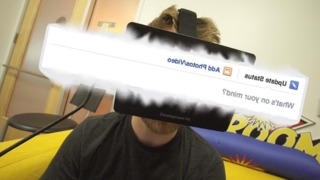I was as surprised as anyone when I heard that Facebook acquired Oculus VR, the company behind the Oculus Rift virtual reality headset. Oculus VR has repeatedly positioned its device as a gaming platform, and outside of supporting social games made by developers like Zynga, Facebook has relatively little experience in gaming at large. This, coupled with the fact that a lot of people dislike some of Facebook's practices, has left a lot of people confused and dismayed by the announcement.
Regardless of Facebook's privacy-related controversies, I think this acquisition is a clear boon for VR's biggest proponents, not a threat. Here’s why.
More Funds for Research and Development
Not long after the announcement, Oculus co-founder and VR visionary Palmer Luckey took to Reddit to defend the decision to join a large and controversial company like Facebook. For someone who’s made VR his life’s work, Luckey knows full well that developing new technologies requires money--lots of money. Luckey had this to say about the benefit of the acquisition:
“The partnership accelerates our vision, allows us to execute on some of our most creative ideas and take risks that were otherwise impossible. Most importantly, it means a better Oculus Rift with fewer compromises even faster than we anticipated.”
So, with more working capital, Oculus VR will improve the Rift faster than it could have before and bring it to market sooner than they previously envisioned? Makes sense. So far so good.
Senua's Saga: Hellblade II Everything To Know The Rogue Prince of Persia - Official New Release Date Gameplay Trailer Genshin Impact - Cutscene Animation "Arataki & Flying Lavender Melon's Rockin' for Life Duet" MultiVersus – Official The Joker Gameplay Reveal Trailer | “Send in the Clowns!” 15 MORE Things You STILL Didn't Know In Zelda Tears Of The Kingdom Firearms Expert Reacts to Ghost Recon Breakpoint's Guns Xbox Studio Closures Are Confusing | Spot On Gray Zone Warfare | Community Briefing Trailer #1 Squirrel With A Gun - Official Announcement Gameplay Trailer Night Slashers: Remake || Official Christopher Smith Character Gameplay Trailer Senua's Saga: Hellblade II - Senua's Psychosis Feature Trailer Street Fighter 6 - 8 Minutes of Akuma Gameplay (High-Level CPU)
Please enter your date of birth to view this video
By clicking 'enter', you agree to GameSpot's
Terms of Use and Privacy Policy
Facebook Has Proven its Ability to Grow Businesses
When Facebook acquired the photo sharing service Instagram nearly two years ago, there were 30 million active users. Today, that number is over 200 million. Did Facebook do this by fundamentally changing Instagram? No. If Zuckerberg’s statements to investors earlier today are to be believed, Instagram has continued to operate independently since it was purchased. That doesn’t mean that Facebook isn’t leveraging Instagram as a product, but apart from reducing it’s functionality on Twitter, Instagram has benefited from the partnership with Facebook because it's largely been left alone.
The association with a company like Facebook, whose proliferation of users is admirable, will expose Oculus VR and the Rift to a wider audience. With more people interested in VR, there’s a greater chance that game publishers will take VR seriously, and the medium will grow faster than it otherwise would have.
Facebook is in this for the Long Run

Facebook’s acquisition of Oculus VR is part of a long-term plan that aims to connect the global population, ideally, within the next 10 years. When discussing the development of VR, including gaming, Zuckerberg stated that he views VR as a five to ten year initiative. What that means is that Facebook isn’t in a rush to turn a profit on the hardware; it’s in a rush to fund development today to get results further down the road.
Though Zuckerberg made it clear that VR can serve Facebook’s business outside of gaming, he also said that Oculus VR was valuated at $2 billion “solely” for its gaming business alone, and that it is the “clearest opportunity” for the device. Time, Facebook money, and its belief in VR gaming equals a brighter future for the medium.
Facebook Supports Open Software Development
Facebook began its Open Compute Project in 2011, which aims to develop advanced, energy efficient data centers, but more importantly, share its findings with the industry at large in the form of open-source design documents. While that doesn’t mean Facebook will give away Oculus VR’s secret sauce, it’s proof that Facebook isn’t solely driven by monopolizing technology, and there’s a great chance it will keep Rift development open to anyone who’s interested.
...with more working capital, Oculus VR will improve the Rift faster than it could have before...
If Facebook throws more money at research and development, if it isn’t in a rush to turn a profit on VR, and it respects the Rift’s value as a gaming platform, why should this acquisition negatively impact the future of VR gaming? We know that the Rift will also be leveraged for non-gaming purposes that tie into Facebook’s advertising network, but that doesn’t mean gaming will as well.
Not everyone is convinced. Mojang pulled out of a potential deal to bring Minecraft to the Rift due to owner Markus Persson’s feelings that “Facebook creeps me out.” But, who says VR gaming will be threatened just because a service-based company with a social focus is involved? I’m optimistic that Facebook will help legitimize VR as a future gaming medium, and that Oculus VR will benefit as a result of time and further investments.
What do you think? Will VR gaming benefit or suffer from Facebook’s involvement?
